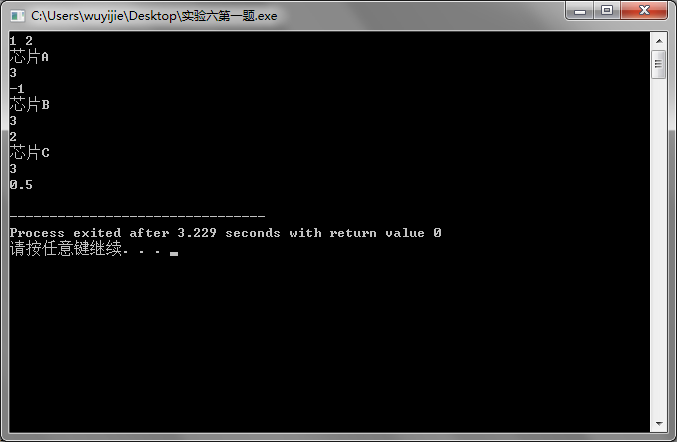第一题 芯片
1 #include<iostream> 2 using namespace std; 3 class basic 4 { 5 public: 6 basic(int a,int b):m(a),n(b){cout<<m+n<<endl;} 7 ~basic(){} 8 private: 9 int m,n; 10 }; 11 class A:public basic 12 { 13 public: 14 A(int a,int b):basic(a,b),m(a),n(b){} 15 ~A(){} 16 void jian() 17 { 18 cout<<m-n<<endl; 19 } 20 private: 21 int m,n; 22 }; 23 class B:public basic 24 { 25 public: 26 B(int a,int b):basic(a,b),m(a),n(b){} 27 ~B(){} 28 void cheng() 29 { 30 cout<<m*n<<endl; 31 } 32 private: 33 int m,n; 34 }; 35 class C:public basic 36 { 37 public: 38 C(int a,int b):basic(a,b),m(a),n(b){} 39 ~C(){} 40 double chu() 41 {double u,i,p; 42 u=m; 43 i=n; 44 p=u/i; 45 cout<<p<<endl; //我觉得,答案保留小数,更好一些,毕竟是除法。 46 } 47 private: 48 int m,n; 49 }; 50 int main() 51 { 52 int i,j; 53 cin>>i>>j; 54 cout<<"芯片A"<<endl; 55 A a(i,j); 56 a.jian(); 57 cout<<"芯片B"<<endl; 58 B b(i,j); 59 b.cheng(); 60 cout<<"芯片C"<<endl; 61 C c(i,j); 62 c.chu(); 63 64 return 0; 65 }

第二题 车
#include<iostream> using namespace std; class vehicle{ public: vehicle(int m,int w):maxspeed(m),weight(w){}; void run(){ cout<<"run"<<endl; }; void stop(){ cout<<"stop"<<endl; }; ~vehicle(){}; protected: int maxspeed,weight; }; class bicycle:virtual public vehicle{ public: bicycle(int m,int w,int h):vehicle(m,w),height(h){}; void run() { cout<<"自行车已启动"<<endl<<"Height:"<<height<<endl; }; void stop() { cout<<"自行车已停止"<<endl; }; ~bicycle(){}; protected: int height; }; class motorcar:virtual public vehicle{ public: motorcar(int m,int w,int s):vehicle(m,w),seatnum(s){}; void run() { cout<<"汽车已启动"<<endl<<"Seatnum:"<<seatnum<<endl; }; void stop() { cout<<"汽车已停止"<<endl; }; ~motorcar(){}; protected: int seatnum; }; class motorcycle:public bicycle,public motorcar{ public: motorcycle(int m,int w,int h,int s):vehicle(m,w),bicycle(m,w,h),motorcar(m,w,s){}; void run() { cout<<"摩托车已启动"<<endl; cout<<"Maxspeed:"<<maxspeed<<endl; cout<<"Height:"<<height<<endl; cout<<"Seatnum:"<<seatnum<<endl; } void stop() { cout<<"摩托车已停止"<<endl; }; ~motorcycle(){}; }; int main() { vehicle a(120,50); a.vehicle::run(); a.vehicle::stop(); bicycle b(50,50,2); b.bicycle::run(); b.bicycle::stop(); motorcar c(120,80,2); c.motorcar::run(); c.motorcar::stop(); motorcycle d(100,80,2,2); d.motorcycle::run(); d.motorcycle::stop(); return 0; }

第三题 Fraction
fraction.h
1 class Fraction 2 { 3 public: 4 Fraction(int x, int y); 5 Fraction(int x); 6 Fraction(); 7 void show(); 8 int gcd(int a, int b); 9 void simplify(); 10 Fraction operator+(Fraction &b); 11 Fraction operator-(Fraction &b); 12 Fraction operator*(Fraction &b); 13 Fraction operator/(Fraction &b); 14 protected: 15 int top; 16 int bottom; 17 };
ifraction.h
#pragma once #include"Fraction.h" class iFraction :public Fraction { private: int left; public: iFraction(int x = 0, int y = 1, int z = 0) :Fraction(x, y), left(z) {} void print(); friend iFraction convertF(iFraction &d); };
fraction.cpp
//fraction.cpp #include"Fraction.h" #include<iostream> #include<cmath> using namespace std; Fraction::Fraction() { top = 0; bottom = 1; } Fraction::Fraction(int x, int y) { top = x; bottom = y; } Fraction::Fraction(int x) { top = x; bottom = 1; } int Fraction::gcd(int a, int b) { if (a%b == 0) return b; else gcd(b, a%b); } void Fraction::simplify() { if (bottom<0) { top = -top; bottom = -bottom; } int g = gcd(abs(top), abs(bottom)); top = top / g; bottom = bottom / g; } void Fraction::show() { Fraction temp; temp.top = top; temp.bottom = bottom; temp.simplify(); if (temp.bottom == 1) cout << temp.top << endl; else cout << temp.top << "/" << temp.bottom << endl; } Fraction Fraction::operator+(Fraction &b) { Fraction temp; temp.top = top * b.bottom + b.top*bottom; temp.bottom = bottom * b.bottom; return temp; } Fraction Fraction::operator-(Fraction &b) { Fraction temp; temp.top = top * b.bottom - b.top*bottom; temp.bottom = bottom * b.bottom; return temp; } Fraction Fraction::operator*(Fraction &b) { Fraction temp; temp.top = top * b.top; temp.bottom = bottom * b.bottom; return temp; } Fraction Fraction::operator/(Fraction &b) { Fraction temp; temp.top = top * b.bottom; temp.bottom = bottom * b.top; return temp; }
ifraction.cpp
#include"iFraction.h" #include<iostream> #include<iomanip> using namespace std; void iFraction::print() { if (top == 0) cout << setw(4) << left << endl; else if (left == 0) { cout << setw(4) << top << endl; cout << setw(4) << '-' << endl; cout << setw(4) << bottom << endl; } else { cout << setw(4) << top << endl; cout << setw(3) << left << '-' << endl; cout << setw(4) << bottom << endl; } } iFraction convertF(iFraction &d) { d.simplify(); d.left += d.top / d.bottom; d.top %= d.bottom; return d; }
main.cpp
#include <iostream> #include "iFraction.h" using namespace std; int main() { Fraction a(-6, 8); Fraction b(5); Fraction c; cout << "a="; a.show(); cout << "b="; b.show(); cout << "c="; c.show(); c = a + b; cout << "c=a+b="; c.show(); c = a - b; cout << "c=a-b="; c.show(); c = a * b; cout << "c=a*b="; c.show(); c = a / b; cout << "c=a/b="; c.show(); iFraction d(8, 6, 4); cout << "d=" << endl; d.print(); d = convertF(d); cout << "将d规范化处理后d=" << endl; d.print(); return 0; }